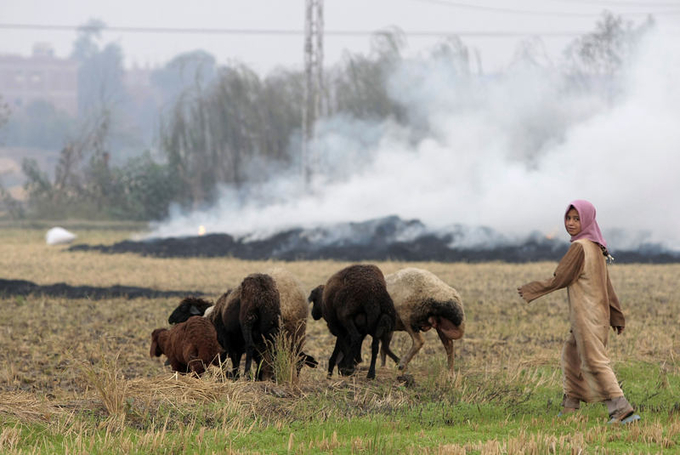November 19, 2025 | 01:22 GMT +7
November 19, 2025 | 01:22 GMT +7
Hotline: 0913.378.918
November 19, 2025 | 01:22 GMT +7
Hotline: 0913.378.918

Burning rice straw after harvest in Egypt increases greenhouse gas emissions in Africa. Photo: MENAFN.
According to research from the Future Ecosystems Program at the University of the Witwatersrand (South Africa), agricultural production and fossil fuel use are the two main causes of increased carbon emissions in Africa. Between 2010 and 2019, burning fossil fuels generated an average of 21.3 million tons of CO2 per year from this region. About half of this CO2 is naturally absorbed, but nearly 10.65 million tons are released into the atmosphere.
Natural sources, such as wildfires, also contribute to increased methane emissions, significantly impacting climate change and land use. The research team developed a comprehensive GHG emissions budget for Africa, using global and local data to determine the causes of the increase in GHG emissions over the past decade.
Dr. Yolandi Ernst, head of the research project at the Wits Global Change Institute, stated: “In Africa, the increase in GHG emissions mainly comes from the use of fossil fuels and agricultural production. Without strong measures to reduce GHGs emissions and an increase in carbon sequestration through expanded forest cover and biomass production, Africa risks becoming a greater emitter of greenhouse gases than it can absorb in the future.”
Dr. Andreas Schwarz Meyer, a researcher from the University of Cape Town (South Africa), agrees and reflects on history: Africa is one of the continents with the lowest GHG emissions. He called for support from the international community to introduce measures to reduce GHG emissions in Africa without affecting key development sectors.
Source: Nature Africa

(VAN) Flagship partnership secures additional GBP 16.9 million to strengthen forest monitoring, transparency and country support to 2030.

(VAN) After a turbulent year for international development, the aid and assistance landscape has shifted, with donors rethinking how, where and why they support sustainable development.

(VAN) A new tool for measuring the economic value of farm animal welfare improvements has been developed, potentially transforming how consumers, retailers and the government evaluate animal welfare policies.

(VAN) The Amazon rainforest could face a renewed surge of deforestation as efforts grow to overturn a long-standing ban that has protected it.

(VAN) Conflict and violence are driving extreme hunger in six major crises.

(VAN) European Union member states are seeking to postpone the implementation of the bloc's anti-deforestation law by another year, an EU negotiating draft dated November 10 shows.

(VAN) Nearly 30 new avian influenza outbreaks have recently been reported in Germany, both on commercial poultry farms and in backyard flocks.